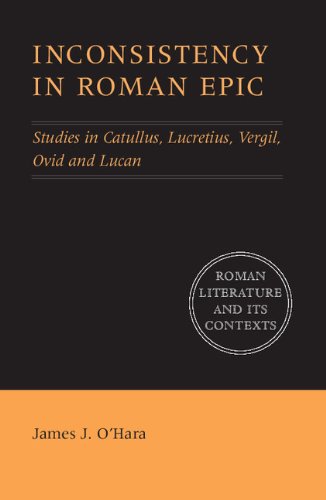Inconsistency in Roman Epic: Studies in Catullus, Lucretius, Vergil, Ovid and Lucan - Couverture rigide

Synopsis
Explores the possibility of providing literary interpretations of inconsistencies in five Roman epics.
Les informations fournies dans la section « Synopsis » peuvent faire référence à une autre édition de ce titre.
À propos de l?auteur
James J. O'Hara is George L. Paddison Professor of Latin at the University of North Carolina, Chapel Hill. He is the author of Death and the Optimistic Prophecy in Vergil's Aeneid (1990) and True Names: Vergil and the Alexandrian Tradition of Etymological Wordplay (1996), as well as numerous articles and reviews on Latin literature.
Les informations fournies dans la section « A propos du livre » peuvent faire référence à une autre édition de ce titre.
Autres éditions populaires du même titre
Résultats de recherche pour Inconsistency in Roman Epic: Studies in Catullus, Lucretius,...
Inconsistency in Roman Epic: Studies in Catullus, Lucretius, Vergil, Ovid and Lucan
Vendeur : Zed Books, New York, NY, Etats-Unis
Hardcover. Etat : Near Fine. 1st Edition. First printing. 8vo. 165 pp. Near Fine. Slight wear to top corners. N° de réf. du vendeur x05725
Acheter D'occasion
Quantité disponible : 1 disponible(s)
Inconsistency in Roman Epic: Studies in Catullus, Lucretius, Vergil, Ovid and Lucan (Roman Literature and its Contexts)
Vendeur : Best Price, Torrance, CA, Etats-Unis
Etat : New. SUPER FAST SHIPPING. N° de réf. du vendeur 9780521641395
Acheter neuf
Quantité disponible : 1 disponible(s)
Inconsistency in Roman Epic (Hardcover)
Vendeur : Grand Eagle Retail, Bensenville, IL, Etats-Unis
Hardcover. Etat : new. Hardcover. How should we react as readers and as critics when two passages in a literary work contradict one another? Classicists once assumed that all inconsistencies in ancient texts needed to be amended, explained away, or lamented. Building on recent work on both Greek and Roman authors, this book explores the possibility of interpreting inconsistencies in Roman epic. After a chapter surveying Greek background material including Homer, tragedy, Plato and the Alexandrians, five chapters argue that comparative study of the literary use of inconsistencies can shed light on major problems in Catullus' Peleus and Thetis, Lucretius' De Rerum Natura, Vergil's Aeneid, Ovid's Metamorphoses, and Lucan's Bellum Civile. Not all inconsistencies can or should be interpreted thematically, but numerous details in these poems, and some ancient and modern theorists, suggest that we can be better readers if we consider how inconsistencies may be functioning in Greek and Roman texts. How should we react as readers and as critics when two passages in a literary work contradict one another? Classicists once assumed that all inconsistencies in ancient texts needed to be amended, explained away, or lamented. This book explores the possibility of interpreting inconsistencies in Roman epic. Shipping may be from multiple locations in the US or from the UK, depending on stock availability. N° de réf. du vendeur 9780521641395
Acheter neuf
Quantité disponible : 1 disponible(s)
Inconsistency in Roman Epic
Vendeur : PBShop.store US, Wood Dale, IL, Etats-Unis
HRD. Etat : New. New Book. Shipped from UK. Established seller since 2000. N° de réf. du vendeur FM-9780521641395
Acheter neuf
Quantité disponible : 3 disponible(s)
Inconsistency in Roman Epic: Studies in Catullus, Lucretius, Vergil, Ovid and Lucan (Roman Literature and its Contexts)
Vendeur : Lucky's Textbooks, Dallas, TX, Etats-Unis
Etat : New. N° de réf. du vendeur ABLIING23Feb2416190010566
Acheter neuf
Quantité disponible : 1 disponible(s)
Inconsistency in Roman Epic
Vendeur : PBShop.store UK, Fairford, GLOS, Royaume-Uni
HRD. Etat : New. New Book. Shipped from UK. Established seller since 2000. N° de réf. du vendeur FM-9780521641395
Acheter neuf
Quantité disponible : 3 disponible(s)
Inconsistency in Roman Epic: Studies in Catullus, Lucretius, Vergil, Ovid and Lucan
Vendeur : Revaluation Books, Exeter, Royaume-Uni
Hardcover. Etat : Brand New. 165 pages. 8.00x5.25x0.75 inches. In Stock. N° de réf. du vendeur __052164139X
Acheter neuf
Quantité disponible : 1 disponible(s)
Inconsistency in Roman Epic: Studies in Catullus, Lucretius, Vergil, Ovid and Lucan
Vendeur : THE SAINT BOOKSTORE, Southport, Royaume-Uni
Hardback. Etat : New. New copy - Usually dispatched within 4 working days. 334. N° de réf. du vendeur B9780521641395
Acheter neuf
Quantité disponible : Plus de 20 disponibles
Inconsistency in Roman Epic (Hardcover)
Vendeur : CitiRetail, Stevenage, Royaume-Uni
Hardcover. Etat : new. Hardcover. How should we react as readers and as critics when two passages in a literary work contradict one another? Classicists once assumed that all inconsistencies in ancient texts needed to be amended, explained away, or lamented. Building on recent work on both Greek and Roman authors, this book explores the possibility of interpreting inconsistencies in Roman epic. After a chapter surveying Greek background material including Homer, tragedy, Plato and the Alexandrians, five chapters argue that comparative study of the literary use of inconsistencies can shed light on major problems in Catullus' Peleus and Thetis, Lucretius' De Rerum Natura, Vergil's Aeneid, Ovid's Metamorphoses, and Lucan's Bellum Civile. Not all inconsistencies can or should be interpreted thematically, but numerous details in these poems, and some ancient and modern theorists, suggest that we can be better readers if we consider how inconsistencies may be functioning in Greek and Roman texts. How should we react as readers and as critics when two passages in a literary work contradict one another? Classicists once assumed that all inconsistencies in ancient texts needed to be amended, explained away, or lamented. This book explores the possibility of interpreting inconsistencies in Roman epic. Shipping may be from our UK warehouse or from our Australian or US warehouses, depending on stock availability. N° de réf. du vendeur 9780521641395
Acheter neuf
Quantité disponible : 1 disponible(s)
Inconsistency in Roman Epic: Studies in Catullus, Lucretius, Vergil, Ovid and Lucan
Vendeur : Revaluation Books, Exeter, Royaume-Uni
Hardcover. Etat : Brand New. 165 pages. 8.00x5.25x0.75 inches. In Stock. N° de réf. du vendeur x-052164139X
Acheter neuf
Quantité disponible : 1 disponible(s)

